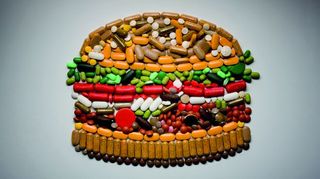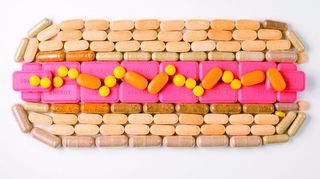Do You Need Supplements In Your Life? The Real Food Versus Pills Smackdown
Is keeping it real always the best way to eat? It depends on your goals… and your life

“Eat food. Not too much. Mostly plants.” This advice from food writer Michael Pollan, author of The Omnivore’s Dilemma, is short, memorable and – on the face of it – pretty sensible. Twinned with a couple of his other dietary commandments – “Don’t eat anything your grandmother wouldn’t recognise” and “Don’t eat anything you can’t spell” – it’s become the go-to advice for anyone who wants to keep eating healthy and easy. But is it really that simple?
For one thing, there’s compelling evidence that “real” food isn’t as real as it once was, its nutritional value leached out by selective breeding, factory farming and over-processing.
For another, pills and powders have never been more advanced, and the best ones harness decades of scientific research into best-practice nutrition to help you top up on nutrients that are nearly impossible to get elsewhere.
And as a man interested in fitness, your needs are likely to be a bit different from those of the more, shall we say, couch-loving gentleman. So based on the evidence, do you need supplements in your life? Can they ever be better than the real thing? And might the day come when you can live on them exclusively?
Round 1: The Problem With Food
Basics first: if you’re going to exist entirely on “real” food, it’s still worth paying attention to where it comes from. Studies comparing wild plants with their shop-bought counterparts, for instance, make worrying reading. One species of wild apple has 100 times more phytonutrients than the Golden Delicious in your basket, and wild dandelions and potatoes have similar advantages over their selectively-bred supermarket brethren.
Part of this is a taste issue – many of the most beneficial phytonutrients have a bitter taste, so when farmers select for sweetness they disappear from the food chain. Farmers, food retailers and consumers also tend to prefer plants that are low in fibre and high in starch and oil, and while these are energy-dense, they’re otherwise nutritionally lacking.
“It’s not about nutrients you can’t get from foods – it’s what the foods no longer contain,” says Nick Barnard, co-founder of food company Rude Health and author of Eat Right.
Get the Coach Newsletter
Sign up for workout ideas, training advice, reviews of the latest gear and more.
“Most industrially farmed foods have shown dramatic declines in micronutrients since the 1950s. Only by seeking out foods from regenerated soils, from pastured or grass-fed animals, and from sustainable stocks of wild fish will you have a chance to find sufficient micronutrients. And even then, you have to eat such foods with a wide diversity, seasonally, and with a range of preparations – some cooked, some raw, some sprouted, some fermented – and with an understanding that some nutrients in food aren’t accessible without cooking or eating with fats.”
RECOMMENDED: Why You Should be Eating Fermented Foods
A good start is to eat vegetables that are nutritionally not too different from their wild ancestors: rocket, for instance, has only been recently domesticated, and comes with a decent hit of cancer-fighting glucosinolates, while herbs bred for their intense flavours have (mostly) escaped the curse of selective sweetening.
Consider your meat carefully too: grass-fed beef comes with more potassium, zinc and sodium than its factory-farmed counterpart, with twice the content of CLA (also available in supplement form) and up to five times the omega 3 fatty acids.
With fish, mercury content in predatory varieties means that even wild-caught can be an unreliable option – so marine food sources that are high in omega 3s but low in mercury, such as krill and algae oil, are arguably the best option.
Round 2: Supp Benefits

There are some nutrients it’s almost impossible to get in adequate quantities from food alone. Vitamin D is the most prominent – a particular problem in the UK and countries at similar latitude where, during the winter, the sun isn’t strong enough to allow your body to produce it naturally. As of 2016, official NHS advice is to take it in supplement form.
RECOMMENDED: Vitamin D Supplements
“I’d recommend 25 micrograms of vitamin D a day in winter,” says Dr Carrie Ruxton, a dietitian at the Health Supplements Information Service. “It’s difficult to get enough otherwise, and crucial for healthy bones, teeth and muscles.”
Ruxton also recommends iron and zinc supplementation for hard-training athletes, alongside a daily 500mg of DHA/EPA for anyone short on omega 3s, with the caveat that it’s still better to get all three from real food.
There’s also good evidence that creatine supplementation might have benefits even for non-gym-goers. It’s thought to have neurally protective effects, for instance, and a 2012 study published in the American Journal Of Psychiatry is not the only one to conclude that it might reduce depression.
The levels taken in most studies would be tricky to get without taking powdered creatine monohydrate.
CLA falls into the same category – it’s easy to get the amount that studies suggest can burn fat via supplements, but nearly impossible with meat.
But just as with real food, quality is an important consideration. “Taking supplements themselves often isn’t an issue,” says nutritionist Dale Pinnock, author of How To Cook Healthily.
“It’s the form of supplement that matters. For example, you can get calcium carbonate or dicalcium malate supplements. The first is chalk with a bioavailability – how much your body can take in – of about 4%, while the other is a superior form with greater uptake. As a general rule, if you can buy a thousand capsules of something for 20p it’s probably not worth taking. You really do get what you pay for when it comes to supplements.” There’s no such thing as a magic pill, especially when it’s cheap.
Round 3: Convenient Food

Even with the best intentions, it’s not always easy to eat perfectly. And when the available options are stripped down to supplements or a service-station sandwich… well, most nutritionists know which they’d prefer.
“There are a ton of advantages to getting anywhere from five to ten servings of vegetables a day, but for a lot of people that isn’t realistic,” says body composition specialist Luke Leaman. When that’s the case, he adds, “it’s worth getting in as much veg as you can, then topping up with a good-quality greens supplement”.
Something that goes hand in hand with not getting enough veg is a lack of fibre, especially for those who spend all day in an office. Not everyone is keen to have a steaming pile of microwaved broccoli every lunchtime, so if a fibre supplement is easiest to stomach, then it’s the best alternative.
For most people, 1g of protein per kilo of bodyweight a day is enough – but with some studies suggesting that 2.5g can add muscle at speed while minimising fat loss, there’s a case to be made for packing it in.
Even the medical community recognises the benefits: the protein-sparing modified fast (a fast but with the bare minimum of fluids, vitamins and protein) is sometimes used for patients requiring serious calorie restriction for fat loss.
Other studies back up what bodybuilders have known for years – protein shakes work for both losing fat and gaining mass, and often better than solid foods if they’re more convenient to take on board.
RECOMMENDED: Protein Shake Recipes
What about fortified foods? Here experts disagree. Barnard is completely against them, but Ruxton and Pinnock are cautiously pro. “They can be great, but the quality of the product is the most important factor,” says Pinnock. “If it has 100mg of vitamin C, but ungodly amounts of sugar and colourants, then it defeats its purpose.”
Ruxton says that “some fortified products can be a good source of B vitamins for energy release while some yogurts have added vitamin D and calcium which boost bone health. But again, you have to look for quality – if the nutrients aren’t absorbed, they might as well not be in there.”
The rise of protein bars means there’s one more thing to look out for. Including high levels of bovine protein or gelatin is a cheap way to up the grams-per-bar on the front of the packet, but doesn’t translate to high-quality protein. Always check the packaging.
A more recent addition to the range is meal replacements. Huel, for instance, has made headlines by claiming that it can replace food almost entirely, offering a minimum of 100% of most essential vitamins and minerals alongside a 37:30:30:3 split of carbs, fats, proteins and fibre.
It adds phytonutrients to its plant-rich base mix, including powerful antioxidants like lycopene and lutein. But there’s still some concern that phytonutrients alone aren’t enough: more than 30 studies, for instance, show that eating foods rich in betacarotene can reduce lung cancer risk, but supplementing with betacarotene (in a 1999 study published in the American Journal Of Clinical Nutrition) did nothing to mitigate the risk. Until more research is done, assume that veg is better.
“Replacing meals entirely is daft,” says Pinnock. “Sure, you might be able to create a product that delivers a complete spectrum of nutrients, but the psychology of the behaviour bothers me. The whole idea of a ritualistic quick fix rather than adjusting behaviour and lifestyle for long-term benefit isn’t a safe state of mind to get in. Also, let’s be honest… it’s pretty dull.”
The Winner: Balanced Diets
The overall message? Supplements can do things that whole foods can’t – but whether you need to take advantage of that depends on your individual situation.
It’s certainly worth getting most of your nutritional intake from real food – and also worth doing some research to make sure you’re getting the best possible nutritional value from what you eat. Fish oil, greens and vitamin D supps are worthwhile additions to your diet, and if you’ve got specific performance or body-composition goals, supplements including CLA, creatine and protein are probably a sensible add-on.
Mother Nature is smart, and we haven’t outwitted her yet, so whenever you can, keep it real. Ultimately, if you’re ever in a conversation with Michael Pollan, remember: your grandmother might not recognise wild rocket or Peruvian potatoes. And if you can’t spell what you’re eating, maybe you just need to learn to spell better.
From 2008 to 2018, Joel worked for Men's Fitness, which predated, and then shared a website with, Coach. Though he spent years running the hills of Bath, he’s since ditched his trainers for a succession of Converse high-tops, since they’re better suited to his love of pulling vans, lifting cars, and hefting logs in a succession of strongman competitions.

